Harden M. McConnell was an American physical chemist. His many awards included the National Medal of Science and the Wolf Prize, and he was elected to the National Academy of Science."
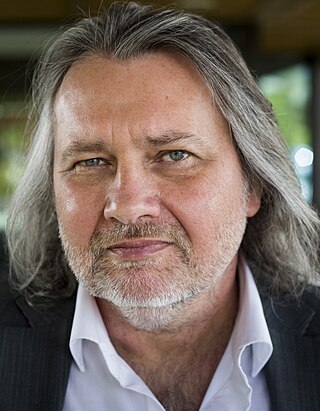
Peter Schwerdtfeger is a German scientist. He holds a chair in theoretical chemistry at Massey University in Auckland, New Zealand, serves as director of the Centre for Theoretical Chemistry and Physics, is the head of the New Zealand Institute for Advanced Study, and is a former president of the Alexander von Humboldt Foundation.
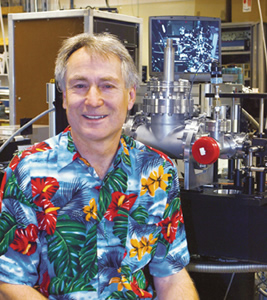
Richard James Saykally is an American chemist. He is currently the Class of 1932 Endowed Professor of Chemistry at the University of California, Berkeley. He has received numerous awards for his research on the molecular characteristics of water and aqueous solutions.

Mark A. Ratner is an American chemist and professor emeritus at Northwestern University whose work focuses on the interplay between molecular structure and molecular properties. He is widely credited as the "father of molecular-scale electronics" thanks to his groundbreaking work with Arieh Aviram in 1974 that first envisioned how electronic circuit elements might be constructed from single molecules and how these circuits might behave.

Howard E. Zimmerman was a professor of chemistry at the University of Wisconsin–Madison. He was elected to the National Academy of Sciences in 1980 and the recipient of the 1986 American Institute of Chemists Chemical Pioneer Award.
Curt Franklin Wittig is a professor of chemistry and the holder of the Paul A. Miller Chair in the college of letters, arts, and sciences at the University of Southern California (USC).

Donald Gene Truhlar is an American scientist working in theoretical and computational chemistry and chemical physics with special emphases on quantum mechanics and chemical dynamics.

Marion Charlotte Thurnauer is an American chemist at Argonne National Laboratory (Argonne). She was the first woman director of the Chemistry Division (CHM) and the first woman division director in the Physical Sciences Directorate at Argonne. She is an Argonne Distinguished Fellow Emeritus in the Chemical Sciences and Engineering Division and has received numerous awards for her work in chemistry and her support of women in science.

Emily A. Carter is the Gerhard R. Andlinger Professor in Energy and the Environment and a professor of Mechanical and Aerospace Engineering (MAE), the Andlinger Center for Energy and the Environment (ACEE), and Applied and Computational Mathematics at Princeton University. She is also a member of the executive management team at the Princeton Plasma Physics Laboratory (PPPL), serving as Senior Strategic Advisor and Associate Laboratory Director for Applied Materials and Sustainability Sciences.
Swapan Kumar Pati is an Indian quantum chemist, a professor of the department of chemistry at the Jawaharlal Nehru Centre for Advanced Scientific Research and the head of the Quantum Theory Molecules to Materials Group at the institute. He is known for his studies on electronic optical and magnetic phenomena in molecular systems and is an elected fellow of the Indian Academy of Sciences, National Academy of Sciences, India and The World Academy of Sciences. The Council of Scientific and Industrial Research, the apex agency of the Government of India for scientific research, awarded him the Shanti Swarup Bhatnagar Prize for Science and Technology, one of the highest Indian science awards, in 2010, for his contributions to chemical sciences.
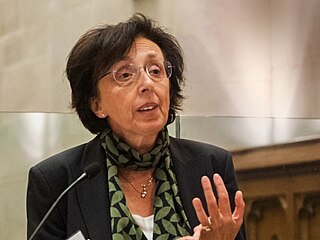
Giulia Galli is a condensed-matter physicist. She is the Liew Family Professor of Electronic Structure and Simulations in the Pritzker School of Molecular Engineering and the department of chemistry at the University of Chicago and senior scientist at Argonne National Laboratory. She is also the director of the Midwest Integrated Center for Computational Materials. She is recognized for her contributions to the fields of computational condensed-matter, materials science, and nanoscience, most notably first principles simulations of materials and liquids, in particular materials for energy, properties of water, and excited state phenomena.

Laura Gagliardi is an Italian theoretical and computational chemist and the Richard and Kathy Leventhal Professor of Chemistry and Molecular Engineering at the University of Chicago. She is known for her work on the development of electronic structure methods and their use for understanding complex chemical systems.
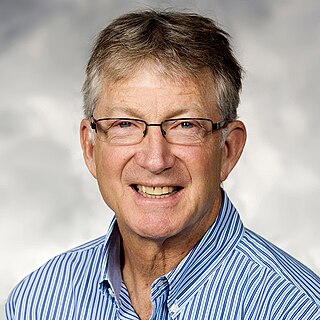
James L. Skinner is an American theoretical chemist. He is the Joseph O. and Elizabeth S. Hirschfelder Professor Emeritus at the University Wisconsin-Madison. Until 2024 he was a member of the Scientific Advisory Board of the Welch Foundation. Until 2020, Skinner was the Crown Family Professor of Molecular Engineering, professor of chemistry, director of the Water Research Initiative and deputy dean for faculty affairs of the Pritzker School of Molecular Engineering at the University of Chicago. Skinner is recognized for his contributions to the fields of theoretical chemistry, nonequilibrium statistical mechanics, linear and nonlinear spectroscopy of liquids, amorphous and crystalline solids, surfaces, proteins, and supercritical fluids. Skinner is the co-author of over 230 peer-reviewed research articles.
Emily A. Weiss is the Mark and Nancy Ratner Professor of Chemistry and director of the Photo-Sciences Research Center at Northwestern University. Her research considers the optical and electronic properties of nanostructures, including hybrid organic–inorganic quantum dots. She was a two-time finalist in the Blavatnik Awards for Young Scientists.
John Philip Simons is a British physical chemist known for his research in photochemistry and photophysics, molecular reaction dynamics and the spectroscopy of biological molecules. He was professor of physical chemistry at the University of Nottingham (1981–93) and Dr. Lee's Professor of Chemistry at the University of Oxford (1993–99).
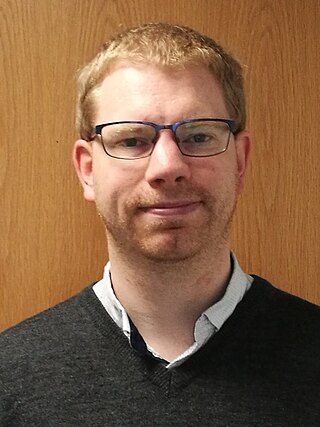
David Paul Mills is a British chemist and a Professor in the Department of Chemistry at The University of Manchester. His research typically investigates the chemistry of the lanthanide and actinide f-block elements. This is generally based on the synthesis of new f-block complexes, structural and bonding properties and their uses in different fields including in nuclear fuel cycles, energy and single molecule magnets.
Nicholas Frederick Chilton is an Australian chemist and a Professor in the Research School of Chemistry at The Australian National University and The Department of Chemistry at The University of Manchester. His research is in the areas of magnetochemistry and computational chemistry, and includes the design of high-temperature single molecule magnets, molecular spin qubits for quantum information science, methods and tools for modelling magnetic calculations.
David Collison is a British chemist and a Professor in the Department of Chemistry at The University of Manchester. His research in general is based on inorganic chemistry and magnetochemistry, specifically on coordination chemistry, electron paramagnetic resonance spectroscopy and f-block chemistry.

Danna Freedman is an American chemist and the Frederick George Keyes Professor of Chemistry at the Massachusetts Institute of Technology. Her group's research focuses on applying inorganic chemistry towards questions in physics, with an emphasis on quantum information science, materials with emergent properties, and magnetism. Freedman was awarded the 2019 ACS Award in Pure Chemistry and a MacArthur Fellowship in 2022.
Gemma C. Solomon is an Australian chemist who is a professor at the Nanoscience Centre in the University of Copenhagen. She serves as Deputy Editor of ACS Physical Chemistry Au. Her research considers quantum interference and molecular electronics.











